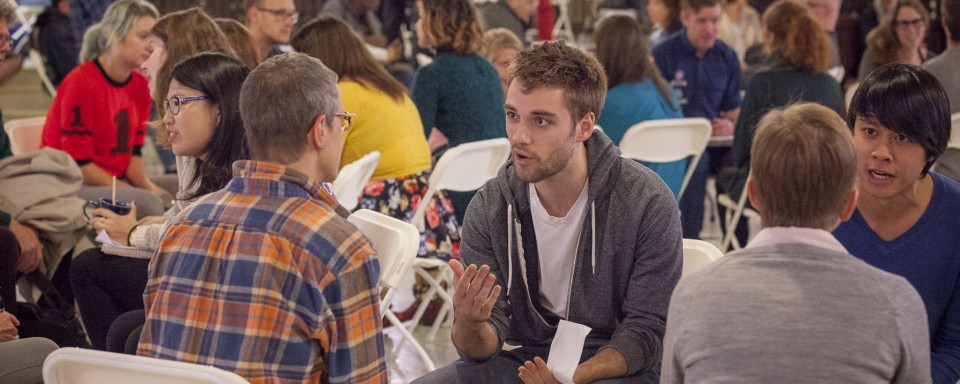by Annick Maugile Flavien
Students of the Working Class Public History class reflected on their experiences of representing oral histories of Pointe-Saint-Charles which are part of the archive at the Centre for Oral History and Digital Storytelling.
Unlike many of my classmates I was not daunted by the task of performing another person’s life story. I guess I’ve become well versed in this type of performance and therapy through my years of community theatre and my recent collaboration with Rencontres/Encounters, a theatre project led by Rachael Van Fossen at Concordia University, which bases much of its work on performance of ‘the other’ as a means for understanding various identities and experiences. These experiences have helped me work through my concerns of how to ‘appropriately’ and ‘accurately’ represent another’s story and trust that if I truly open myself to the story, I will know how to best represent it. As Steven High told us prior to the activity, it’s really about doing justice to the story you heard not necessarily replicating it.
The person assigned to me for this activity was June O’Donnell, a Pointe-Ste-Charles native who self-proclaims as the oldest person on her street. As I listened to her interview, I was so blown away about the amount of life experiences she accumulated over the years but even more so by how good her memory was; I’m barely a third of her age and I don’t think I could pull on as many memories on command as she did. This got me thinking about what memory is and how much we rely on it in Oral history though we can all agree that it is an extremely mediated channel. After this reflection, I realized that I there was no way for me to know if in fact if June had ‘good memory’ but it was clear that whether her memories were true, real, accurate or not, she fully embraced them, as I would need to if I wanted to best represent them. So I gave her interview a second listen and let myself enter her memories as if they were my own… of course I remember playing in the park down the street as a child, I remember all the Doreens on my block, and I remember my first job at the Eaton center. As I listened to her speak, I painted all those images in my mind and let myself believe I was there. Two days later it was time for the speed dating activity and there I was pulling on June’s memories as smoothly as I would if they were my own. I was honestly surprised by how many details I remembered and how each person I interacted with brought out a new memory or detail from my mind.
As we went around the circle I felt proud of how I holding June’s memories in my mind and how they were now almost a part of me because I embraced them with open arms but this feeling took a strong turn when I encountered a classmate who was performing a life story I didn’t agree with. Here I was in front of the story of a woman who advocates for Condos, and speaks down to the south side of Pointe-Ste-Charles, I felt myself boil as I heard her speak, not only because of my personal feelings but also because I felt a need to defend June’s memories, memories that I had embraced as my own. This was very interesting feeling, that I have yet to fully dissect but it raised some important questions that I’ll need to work out for myself as I continue to work with Oral History. Would I have been able to embrace this other women’s story as I did June’s, or any other triggering story? Is it fair for me to suppose June’s reaction to this person just because I hold some of her memories? If holding another’s stories and memories can be a triggering experience at times, what are the mechanisms to put in place to ensure safe detachment from these stories while still embracing their essence?
by Annick Maugile Flavien
